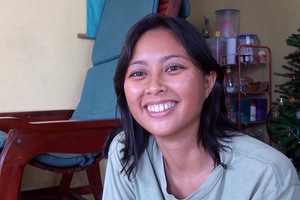Serina Abdul Rahman

- Location
-
Johor Bahru
MALAYSIA
- First meeting
- 2010, December 25th
- Last update
- Keywords
- environmental education for coastal management
My hypothesis is that if you teach children about environmentally-friendly behavior or natural heritage, the children will then educate the rest of the community, including their parents, their friends, their elders, anybody else, and we can use that for coastal management.
In a fishing village in Malaysia, where poverty rate is high and activities for young peopl are rare, Serina Abdul Rahman has set up an environment club. Young people from 3 to 18 years can come and learn while having fun: organic farming, science, English, games, swimming, etc.
These actions are also a research project and Serina’s PhD work on the management of coastal coastal areas through environmental education.
Here is an extract of Serina’s interview: more information and updates coming soon!
Introduction
My name is Serina. I am a PhD Student. I live in this village which is also my study site. My PhD is on environmental education for coastal zone management. My hypothesis is that if you teach children about environmentally-friendly behavior or natural heritage for example, the children will then educate the rest of the community, including their parents, their friends, their elders, anybody else, and we can use that for coastal management. I teach the kids for an extended period of time and then I test to see whether the kids are teaching other people.
Within the program, there are theory sessions on habitats in this area which include seagrasses, mangroves, rocky shores, and they have an organic farm that they work on. They manage and they harvest and they also learn ecotourism skills. They work as guides and show people who come to visit around the seagrasses, mangroves, rocky shores and the farm. They do scientific based monitoring on the seagrass area, mangroves and rocky shores.
About the club Kelab alami
In order to do my research, I set up an environmental club. It’s called Kelab alami.
It’s open to any child from this mukim (this is a sort of region, it’s a string of 9 fishing villages). Any kid within the mukim can come and join the club as long as they are polite, hard-working, committed, and as long as they know to work as a team. Any child who is lazy, selfish or very rude to the parents or elders, we kick them out. There are behavior requirements, but no age requirements. The youngest members are 3 years old: they come, they play and they learn a little bit. Our main members are from about 9 to 18 years old. It’s open to any kid in this age range, from any of the 5 school around here. We did not set up the club in a school because it would be then limited to keep them in school.
Activities
The children come every week on Sunday (during the week they have school of course and this is out of the school activity). When they come on Sunday, most of the time they work on the farm first, and then we have a 1 or 2 hours theorical session, or some activities that are related to the environment.
It could be a talk on seagrass, and then they do drawing or they do a work or they make something. We make them recycling so they make stuff from bottles.
I try to bring friends who are experts and we have people who come to speak about various topics for the kids to learn: bivalves, corals, seaweeds, seagrasses, etc. It is always good for them to meet outside people.
Some kids who have a bicycle or a motorbike, or who live nearby, come everyday after school. They sit around, they play. We have a mini library with books, information, games and sport equipments.
The kids have these activities every week. During school holidays, it’s a little bit more often, maybe 2-3 times a week, because they have more time to come. Sometimes they get homework, they have to interview people, just to find out a bit more about area, the natural heritage, what used to be here in the past that is not here anymore with regards to animals and plants or others. We would not know about because it is not here anymore. Then, with all the information that they get, the goal is to write a bunch of guides for this area by themselves for themselves. There are a lot of scientists who come to this area, but unfortunately nothing comes back to the local community. My goal is to give something back to the local people. The kids learn and share with others.
We also set up a mini-natural history museum: we collect samples, and we are supported by my university which gives us bottles and products. Thus the kids can see and they can show the parents what we have in the area. Sometimes they don’t know and it is good to find out before it is all gone as well, so there is a record for the local community.
To be continued!
The integral interview and the images of Christmas 2010 at the club Kelab Alami to follow soon!